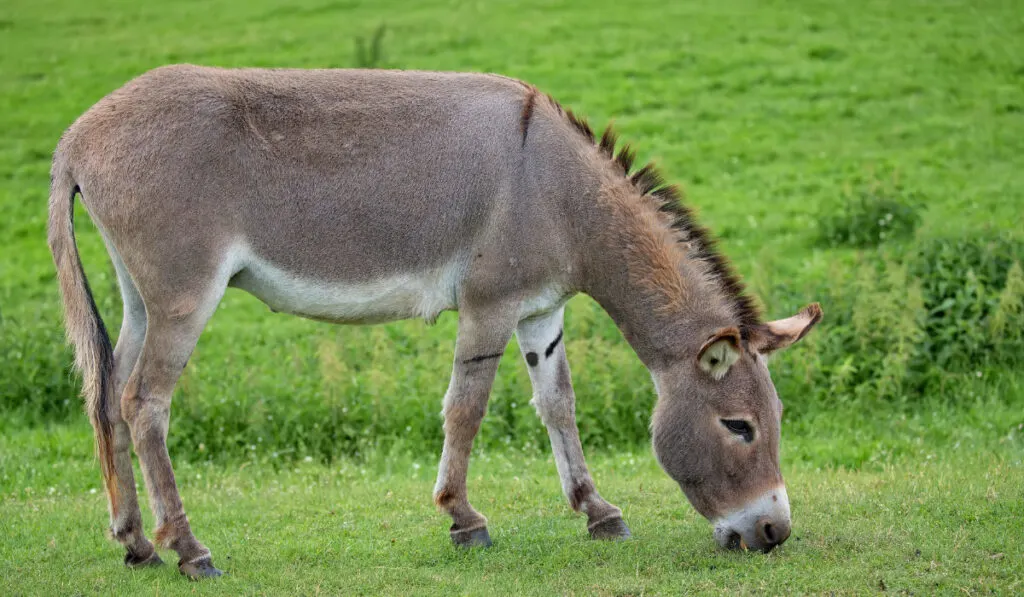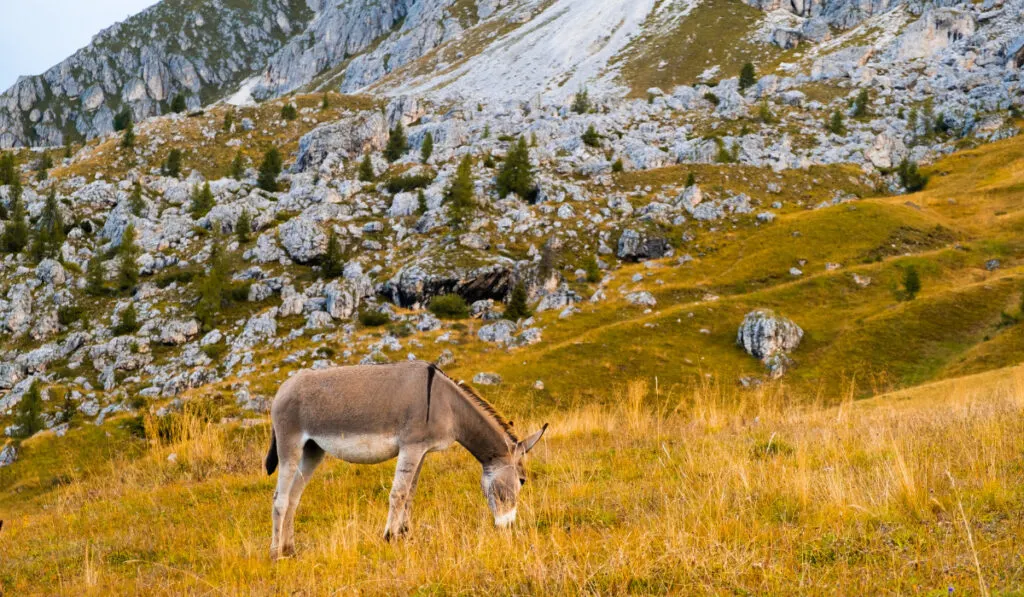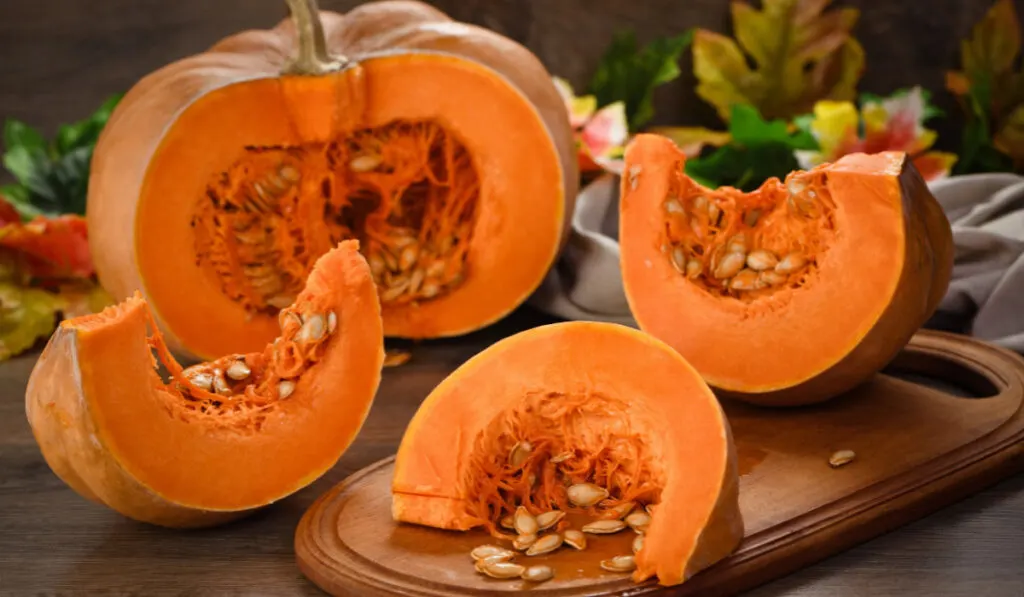If you are lucky to be the owner of a donkey, you probably know how much donkeys love treats. From fruits and vegetables to a variety of herbs and leaves, donkeys are easy to please and happy to help themselves to any treat that comes their way.

The arrival of fall means we are deep into pumpkin season with the gorgeous orange squash being served in everything from pie to donuts and coffee. With so much bounty to enjoy you may be wondering, is it safe to give some of my leftover pumpkins to my donkeys?
Can donkeys eat pumpkins?
Donkeys can safely eat pumpkins including the skin, flesh and seeds. Pumpkins should be fed in moderation and only as a treat.
While pumpkin is almost a hundred percent water, and therefore low in calories, you should feed pumpkin to your donkey only as a treat.
Table of Contents
Donkey Nutritional Needs
Donkeys need fewer calories to maintain their weight than a pony of the same size, so it’s important to keep an eye on their diet throughout their lives.
Donkeys have been used as working animals for millennia, and their nutritional needs and metabolism evolved to match these harsh conditions.
Nowadays, in countries such as the United States where they are traditionally kept as non-working animals, obesity is one of the most dangerous conditions for donkeys.
According to The Donkey Sanctuary, a healthy, adult donkey’s ideal diet should consist mainly of straw, up to 75% in the summer and 50% in the winter, supplemented by hay or haylage.
It’s best for donkeys to eat small, frequent meals and to always have access to fresh water.

In addition to their high fiber diet, donkeys need several essential minerals for optimum health including calcium, phosphorus, magnesium, sodium and chloride, potassium, and sulfur.
Calcium and phosphorus help with bone growth and repair, magnesium helps with metabolism, and potassium helps muscle function. Donkeys usually obtain these minerals through a vitamin and mineral supplement.
Due to their unique metabolism, donkeys should enjoy treats in moderation with only one small handful portion maximum per day.
Pumpkin Nutritional Value
Low in calories and high in fiber, pumpkins are nonetheless a nutrient-dense food. One cup of raw pumpkin has 26 calories, 1 gram of fiber, and is almost all water at 92 percent!
Pumpkins are also a source of Vitamin A, Vitamin E, Vitamin C, Vitamin B-6, riboflavin, thiamin, niacin, folate, pantothenic acid.
They are also a great source of six essential minerals: magnesium, potassium, copper, manganese, iron, and phosphorus.
Its high water and fiber content, together with being an excellent source of essential minerals, makes pumpkin a very healthy treat for donkeys.
Feeding Pumpkin as a Donkey Treat
Like all treats, moderation is the key when it comes to feeding pumpkin to your donkeys. You should also consider the individual health and age of your donkeys before you feed them any treats of any kind.
More importantly, you should always consult your donkeys’ veterinarian or nutritionist before making any changes in their diet or feeding them new treats.

If you find your donkeys love pumpkin and you would like to feed it to them off-season, you can use pure pumpkin puree.
However, always make sure you use only plain pumpkin puree and not pumpkin pie filling.
Unlike canned pumpkin puree, which is 100 percent pumpkin without any additives or spices, pumpkin pie filling contains all your favorite fall spices as well as extra sugar.
Donkey Pumpkin Treat Dos
- Keep the pumpkin skin on since it is safe for the donkeys to eat.
- Cut the pumpkin into small chunks to avoid choking.
- Leave the seeds inside the pumpkin if you prefer since they are safe for donkeys.
- Limit pumpkin treats to a small handful per day.
- Consider the individual nutrition needs of each donkey.
- Expand treats to other squashes that are safe for donkeys including banana squash, Boston marrow, butternut squash, crookneck squash, and summer squash are all safe for donkeys.
- Use caution if mixing treats since some gourds and squashes are toxic to donkeys.
Donkey Pumpkin Treat Don’ts
- Don’t feed your donkey pumpkin seeds meant for planting since they can contain harmful chemicals.
- Be careful if your donkey has dental issues since raw pumpkin may be hard for them to chew.
- Avoid feeding pumpkin treats by hand as this can encourage biting.
- Don’t feed your donkey pumpkins that have started to become soft or sag as they may contain mold.
- Use caution when feeding leftover carved pumpkins and be sure to watch for melted candle wax.
Final Thoughts
Pumpkin can be a fun treat for your donkeys when given in moderation with a balanced diet. When it comes to your donkey’s nutrition, it is important to consult your veterinarian or nutritionist first. A typical donkey diet is high in fiber from straw and hay sources but can occasionally be supplemented with a small amount of pumpkin or other fresh produce.
Sources
- https://thehorse.com/features/tale-two-donkeys/
- https://stablemanagement.com/articles/feeding-mules-and-donkeys#:~:text=Studies%20have%20shown%20that%20donkeys,to%20that%20of%20a%20goat.
- https://www.thedonkeysanctuary.org.uk/what-we-do/knowledge-and-advice/for-owners/feeding-donkeys
- https://www.thedonkeysanctuary.org.uk/what-we-do/knowledge-and-advice/for-owners/tasty-tempters
- https://fdc.nal.usda.gov/fdc-app.html#/food-details/168448/nutrients
- https://www.medicalnewstoday.com/articles/279610#nutrition
- https://donkeywise.org/2017/08/01/what-treats-can-i-give-my-donkeys/
- https://donkeywise.org/2017/09/19/safe-plants-for-donkeys/
- https://www.proequinegrooms.com/tips/barn-management/can-your-horse-eat-pumpkin

